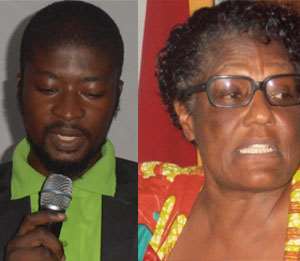
THE GRADUATE School of Nuclear and Allied Sciences on Wednesday joined Ghanaians and other countries around the world to celebrate World Malaria Day with a call on Ghanaians to acquire in-depth knowledge about the cause and effect of the disease.
President of the Ghana Nuclear Society (student chapter), Rhoe Christian Quaye said apart from Ghanaians seeking prompt and appropriate treatment for malaria, there is a need for them to know various effective methods of eradicating the disease.
Mr. Quaye made the call during a day's seminar in Accra themed 'Eradicating Malaria through Nuclear Technology' to sensitize Ghanaians on how nuclear technology could effectively be used to eradicate malaria.
According to him, since currently Artemisinin, the most effective drug against malaria was proving ineffective on a new strain discovered near the Thai-Myanmar border there was a need for nuclear scientists to provide an adequate solution to the ever growing pandemic.
'Scientists all over the world have been tasked every now and then to develop various means to eradicate this heinous disease caused by our own general mosquito.'
Mr. Quaye stressed the need for Ghanaians to be enlightened on the role nuclear technology could play in the effective eradication of malaria.
Dr. A. Adabie-Gomez, a resource person speaking on the 'Role of Nuclear Technology in Malaria Eradication' noted that malaria kills around 1.4 - 2.6 million persons per year worldwide and is second only to tuberculosis in its impact on the world's health – mostly African children.
She said the estimated annual economic burden of malaria in Africa exceeds $2billion.
According to her, 90 per cent of all malaria cases are in sub-Saharan Africa with 300 - 500 million clinical cases per year globally.
Dr. Adabie-Gomez stressed that there are lots of challenges facing Ghanaians on the eradication of malaria such as ignorance and misconceptions about causes of the disease, misdiagnosis of malaria with its attendant wrong treatment and over-consumption of anti malarias.
Dr. Adabie-Gomez stressed the need for scientists to join in the educational campaign to educate Ghanaians on nuclear techniques which involve the induction of sterility in the insect to be controlled using radiation.
Explaining how radiation could help eradicate malaria, she said it would induce dominant lethal mutations into the mosquito which kill the offspring at any stage in the life cycle depending on the level of lethality.
'When the modified mosquitoes mate with the local mosquitoes, all the offspring inherit a copy of the mutant gene that kills them. Some eggs die before they hatch, and most of the offspring die as larvae, but even those who manage to hatch survive only a short time as adults.'
The theme for World Malaria Day 2012 is “Sustain Gains, Save Lives: Invest in Malaria.”
By Stella Danso Addai




 We’ll protect state wealth from opaque deals – Prof Jane Naana
We’ll protect state wealth from opaque deals – Prof Jane Naana
 Mauritania president says running for second term in June polls
Mauritania president says running for second term in June polls
 I won't ever say I was a mere driver’s mate' — Prof. Opoku-Agyemang
I won't ever say I was a mere driver’s mate' — Prof. Opoku-Agyemang
 2024 polls: 'EC struggling to defend credibility'— Prof. Opoku-Agyemang
2024 polls: 'EC struggling to defend credibility'— Prof. Opoku-Agyemang
 Akufo-Addo gov't's 'greed, unbridled arrogance, unrestrained impunity, sheer dis...
Akufo-Addo gov't's 'greed, unbridled arrogance, unrestrained impunity, sheer dis...
 Election 2024: Ghana needs an urgent reset, a leadership that is inspiring – Ma...
Election 2024: Ghana needs an urgent reset, a leadership that is inspiring – Ma...
 Partner NDC to rollout a future of limitless prospects – Prof Jane Naana Opoku-A...
Partner NDC to rollout a future of limitless prospects – Prof Jane Naana Opoku-A...
 NPP will remain in gov’t till Jesus comes — Diana Asamoah
NPP will remain in gov’t till Jesus comes — Diana Asamoah
 Sunyani Technical University demands apology from former SRC president over sex-...
Sunyani Technical University demands apology from former SRC president over sex-...
 'Dumsor' was resolved by Mahama but ‘incompetent' Akufo-Addo has destroyed the g...
'Dumsor' was resolved by Mahama but ‘incompetent' Akufo-Addo has destroyed the g...
